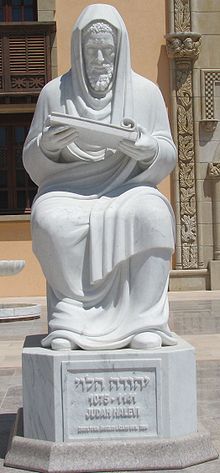
Back يهوذا اللاوي Arabic يهوذا اللاوى ARZ Yəhuda Haləvi Azerbaijani Yehudà ha-Leví Catalan Jehuda ha-Levi Czech Иегуда Халеви CV Jehuda Halevi Welsh Jehuda ha-Levi German Ιούδας Αλεβί Greek Jehudah Halevi Esperanto
Judah Halevi | |
|---|---|
 Statue in Caesarea, Israel. | |
| Born | c. 1075 |
| Died | 1141 (66 years) |
| Notable work | Sefer ha-Kuzari[1] |
| Era | Medieval philosophy |
| Region | Jewish philosophy |
Main interests | Religious philosophy |
Judah Halevi (also Yehuda Halevi or ha-Levi; Hebrew: יהודה הלוי and Judah ben Shmuel Halevi יהודה בן שמואל הלוי; Arabic: يهوذا اللاوي, romanized: Yahūḏa al-Lāwī; c. 1075 – 1141) was a Sephardic Jewish poet, physician and philosopher. He was born in Al-Andalus, either in Toledo or Tudela, in 1075.[2] He is thought to have died in 1141, in either Jerusalem, at that point the Crusader Kingdom of Jerusalem, or in Alexandria, Egypt.[2]
Halevi is considered one of the greatest Hebrew poets, celebrated both for his secular and religious poems, many of which appear in present-day liturgy. His most famous philosophical work is the Sefer ha-Kuzari.[3]
- ^ Silverstein, Adam J. (2015). "Abrahamic Experiments in History". In Blidstein, Moshe; Silverstein, Adam J.; Stroumsa, Guy G. (eds.). The Oxford Handbook of the Abrahamic Religions. Oxford: Oxford University Press. pp. 43–51. doi:10.1093/oxfordhb/9780199697762.013.35. ISBN 978-0-19-969776-2. LCCN 2014960132. S2CID 170623059.
- ^ a b Encyclopaedia Judaica. Jerusalem, Israel: Keter Publishing House. 1971. pp. 355–366.
- ^ Blidstein, Moshe; Silverstein, Adam J. (2015). "Abrahamic Experiments in History". The Oxford Handbook of Abrahamic Religions. Oxford University Press. pp. 43–51. ISBN 978-0-19-969776-2.
{{cite book}}: CS1 maint: multiple names: authors list (link)
© MMXXIII Rich X Search. We shall prevail. All rights reserved. Rich X Search